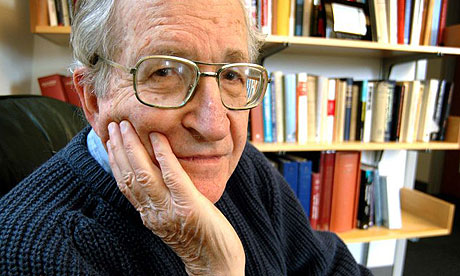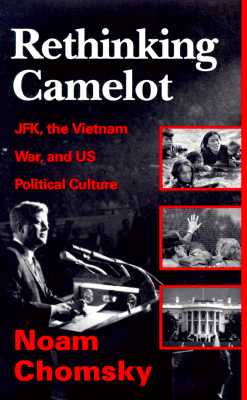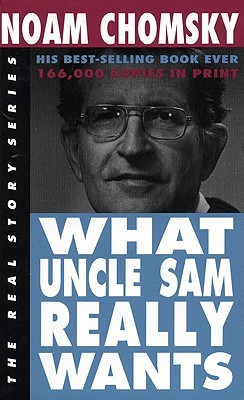Noam Chomsky -an activist, anarchist and linguist- is revered in some radical circles and reviled in others. The MIT professor writes extensively on US imperialism, politics and propaganda and has a knack for getting in fights with other critical theorists.
These books, most of which are from the 1990s, are freely available on ZNet. We’d like to thank Open Culture for the find, however. To read the books, open the “Table of contents” link on the ZNet page.
Necessary Illusions: Thought Control in Democratic Societies
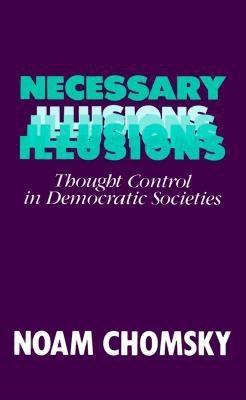 “What role do the media play in a capitalist democracy? Based on the Massey Lectures, delivered in Canada in November 1988, Necessary Illusions argues that, far from performing a watchdog role, the “free press” serves the needs of those in power. With this book, Chomsky rips away the mask of propaganda that portrays the media as advocates of free speech and democracy.”
“What role do the media play in a capitalist democracy? Based on the Massey Lectures, delivered in Canada in November 1988, Necessary Illusions argues that, far from performing a watchdog role, the “free press” serves the needs of those in power. With this book, Chomsky rips away the mask of propaganda that portrays the media as advocates of free speech and democracy.”
Read it here.
Deterring Democracy
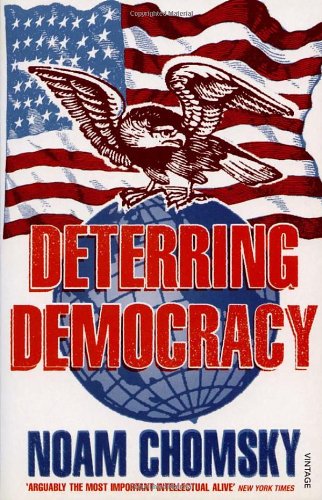 “Chomsky details the major shift in global politics that has left the United States unchallenged as the preeminent military power even as its economic might has declined drastically in the face of competition from Germany and Japan. Deterring Democracy points to the potentially catastrophic consequences of this new imbalance, and reveals a world in which the United States exploits its advantage ruthlessly to enforce its national interests — from Nicaragua to the Philippines, Panama to the Middle East. The new world order (in which the New World gives the orders) has arrived. ”
“Chomsky details the major shift in global politics that has left the United States unchallenged as the preeminent military power even as its economic might has declined drastically in the face of competition from Germany and Japan. Deterring Democracy points to the potentially catastrophic consequences of this new imbalance, and reveals a world in which the United States exploits its advantage ruthlessly to enforce its national interests — from Nicaragua to the Philippines, Panama to the Middle East. The new world order (in which the New World gives the orders) has arrived. ”
Read it here.
Year 501: The Conquest Continues
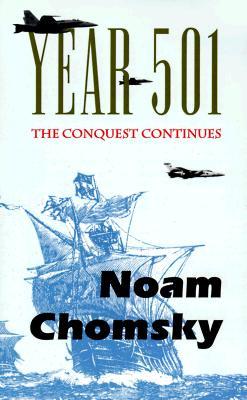 “Noting that the current period has much in common with the Colombian Age of Imperialism, during which Western Europe conquered most of the world, Chomsky focuses on various historical moments in this march of imperial power, up to and including the current axis where the U.S., Germany, and Japan share world economic control with the U.S. reveling in a monopoly of military might.”
“Noting that the current period has much in common with the Colombian Age of Imperialism, during which Western Europe conquered most of the world, Chomsky focuses on various historical moments in this march of imperial power, up to and including the current axis where the U.S., Germany, and Japan share world economic control with the U.S. reveling in a monopoly of military might.”
Read it here.
Rethinking Camelot: JFK, the Vietnam War, and U.S. Political Culture
“This book is an analysis of John F. Kennedy’s role in the U.S. invasion of Vietnam and a reflection of the elite political culture that allowed and encouraged the Cold War.”
Read it here.
What Uncle Sam Really Wants
“A brilliant distillation of the real motivations behind U.S. foreign policy, compiled from talks and interviews completed between 1986 and 1991, with particular attention to Central America.”
Read it here.
The Prosperous Few and the Restless Many
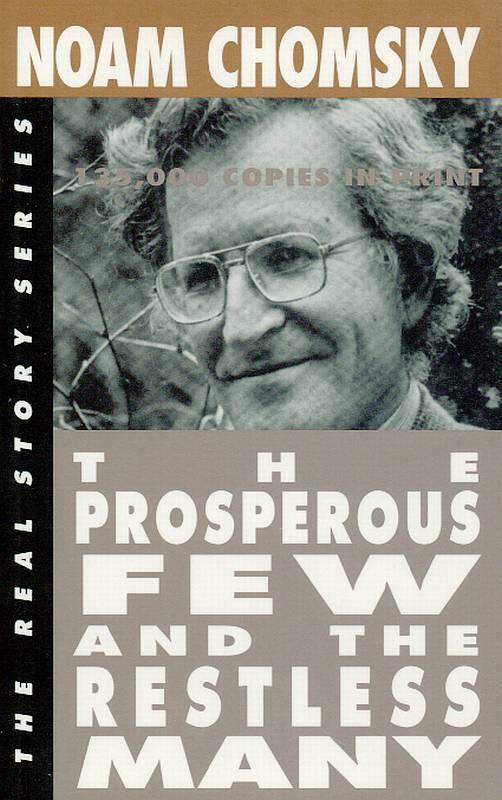 “These wide-ranging interviews, from 1992 and 1993, cover everything from Bosnia and Somalia to biotechnology and nonviolence, with particular attention to the “Third Worldization” of the United States.”
“These wide-ranging interviews, from 1992 and 1993, cover everything from Bosnia and Somalia to biotechnology and nonviolence, with particular attention to the “Third Worldization” of the United States.”
Read it here.
Secrets, Lies and Democracy
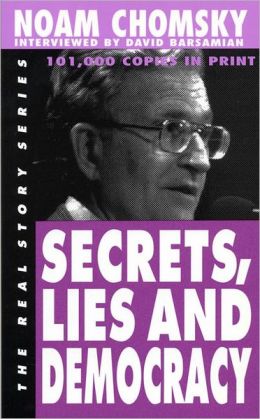 “These interviews, conducted in 1993 and 1994, touch on a range of domestic and international topics from corporate welfare and free trade to gun control and religious fundamentalism.”
“These interviews, conducted in 1993 and 1994, touch on a range of domestic and international topics from corporate welfare and free trade to gun control and religious fundamentalism.”
Read it here.
Keeping the Rabble in Line
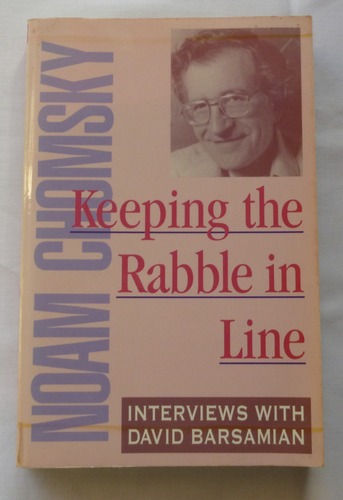 “Barsamian’s historically grounded, well-informed and probing questions prompt Chomsky to deconstruct concepts of class, media and economics. Chomsky deftly addresses domestic and foreign conundrums including health care, the recent crime bill and NAFTA. While these interviews span a two-year period and end early in 1994, they remain provocative and timely, with Chomsky’s insights on Haiti, Northern Ireland and the Middle East proving especially resonant. Ultimately, Rabble serves as a Chomsky primer that is without condescension, and the question-and-answer format shows him at his most concise and adroit. His criticism exposes democracies as business-run societies that render the general population isolated from politics, persuasively suggesting that we are on the verge of a social breakdown. ”
“Barsamian’s historically grounded, well-informed and probing questions prompt Chomsky to deconstruct concepts of class, media and economics. Chomsky deftly addresses domestic and foreign conundrums including health care, the recent crime bill and NAFTA. While these interviews span a two-year period and end early in 1994, they remain provocative and timely, with Chomsky’s insights on Haiti, Northern Ireland and the Middle East proving especially resonant. Ultimately, Rabble serves as a Chomsky primer that is without condescension, and the question-and-answer format shows him at his most concise and adroit. His criticism exposes democracies as business-run societies that render the general population isolated from politics, persuasively suggesting that we are on the verge of a social breakdown. ”
Read it here.
Excerpts From Powers and Prospects: Reflections on Human Nature and the Social Order
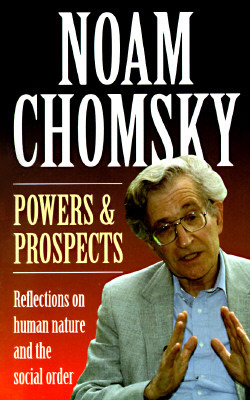 “In this wide-ranging intellectual tour de force, Chomsky brings together his thoughts on topics ranging from language and human nature to the Middle East settlement and the role of East Timor in the New World Order. This is the first collection of his essays in recent years to bring together questions of philosophy, ethics and foreign policy.”
“In this wide-ranging intellectual tour de force, Chomsky brings together his thoughts on topics ranging from language and human nature to the Middle East settlement and the role of East Timor in the New World Order. This is the first collection of his essays in recent years to bring together questions of philosophy, ethics and foreign policy.”
Read it here.
[H/T Open Culture]

